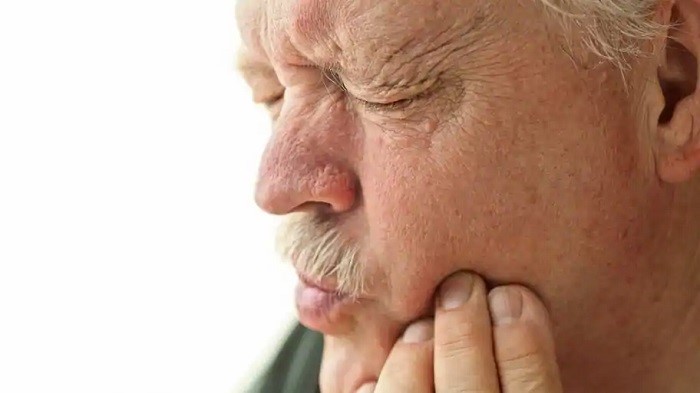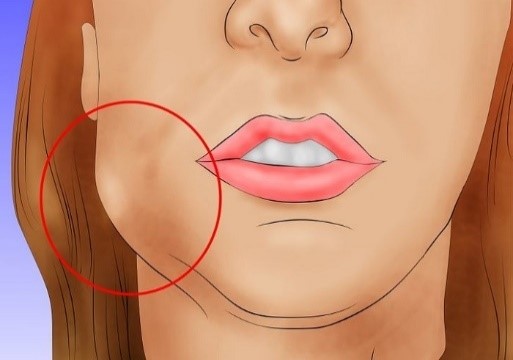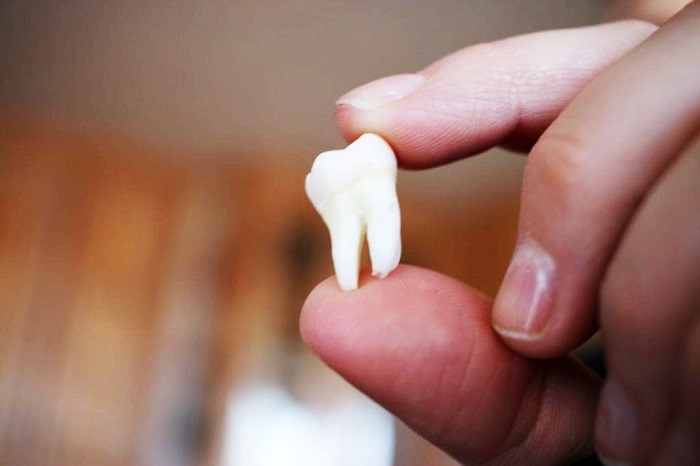Pericoronitis is one of those medical terms that rarely comes up in daily conversation, and it sounds vaguely overwhelming. Although wisdom tooth infection is quite a bit more common sounding, it is no less intimidating. People, in general, don’t want to think about having an infection and certainly don’t want to have an infection in their teeth. If you are having symptoms typical of an infected wisdom tooth, you are likely looking to understand both what’s going on and what you can do about it right away! So, what is pericoronitis and what can you do about it immediately and at home?
Causes of Wisdom Tooth Infection
Below are some possible causes of an infection in a wisdom tooth or the spot where it once was.
Wisdom tooth impaction
A wisdom tooth may emerge only partially above the gumline or emerge at an angle. Dentists refer to this as impaction. Impaction may occur if there is not enough space in the mouth for the tooth to emerge fully, in a situation called overcrowding.
Food debris and plaque can accumulate around a partially erupted wisdom tooth, making it susceptible to infection. The medical term for infection and inflammation around an impacted wisdom tooth is pericoronitis.
Cavities
A cavity in a wisdom tooth can cause it to become infected. Because the wisdom teeth sit at the back of the mouth, they can be more difficult to clean than other teeth. Flossing around the wisdom teeth may be particularly difficult. As a result, these teeth are especially susceptible to cavities.
Wisdom tooth extraction
Wisdom tooth extraction involves removing the teeth. It is a common procedure for treating or preventing problems caused by teeth that are emerging or partially erupted.
An infection can develop at the site of the extraction. A study found, for example, that 8.4% of people who had wisdom teeth extracted went on to experience minor complications, such as:
- infection
- bleeding after surgery
- temporary nerve damage
- dry socket, which occurs when a blood clot does not form at the site of the extraction
Other causes of tooth or gum pain
Pain in the teeth or gums may not indicate an infection. It can be a symptom of:
- gum disease, or gingivitis
- gum recession
- poor brushing or flossing techniques
- a cavity
- worn tooth enamel
- tooth grinding, or bruxism
- a cracked tooth
- worn dental fillings
- sinusproblems
If tooth or gum pain lasts more than a few days, make an appointment with a dentist. They will work to identify the cause of the pain and recommend appropriate treatments.
Signs of Wisdom Tooth Infection
If you believe you have signs of wisdom tooth infection, or pericoronitis, it is important to give dentist a call right away. Here’s what to look for:
Painful Gums
One of the first signs is redness in the gum tissue where the tooth is emerging. Of course, the eruption of a wisdom tooth alone is enough to cause some redness and pain, but in the case of infection, the pain is intense, the redness persists, and you may also experience swelling and even bleeding. The gum tissue is usually so tender that it is difficult to brush your teeth in this area of the mouth.
Jaw Pain
You may experience jaw pain or even muscle spasms in your jaw when you have a wisdom tooth abscess. Again, jaw pain is not uncommon when wisdom teeth emerge, but in the case of infection, you will experience intense, throbbing pain rather than simple discomfort.
Swelling
When there is a wisdom tooth abscess, swelling typically starts in the gum tissue surrounding the wisdom tooth. As the infection progresses, this swelling can spread beyond the gum tissue and extend to the face and lymph nodes as well.
Foul Odor and Taste
The infected gum tissue surrounding the wisdom tooth may fill with pus; as this pus seeps out into the mouth, it can cause bad breath and an unpleasant taste. Warm salt water rinses can temporarily alleviate these symptoms, but they must be addressed by your oral surgeon.
Fever
As with an infection anywhere else in the body, you may have a fever or chills. If you are experiencing any of the other symptoms listed here along with a fever, it is almost certain that your wisdom tooth is infected.
Difficulty Eating
Swelling, jaw spasms, and painful gums can all lead to extreme pain when eating, particularly when biting down and applying pressure to the infected area. Additionally, the foul taste in your mouth may make food unappetizing.
Wisdom Tooth Infection Complications
A wisdom tooth infection sometimes leads to other health problems. Below, we describe some of these complications.
Cysts
A dental cyst is a sac of fluid that forms near a tooth, and a cyst may result from a wisdom tooth impaction or infection. Over time, cysts can affect the roots of nearby teeth, and they may even damage or weaken the jawbone.
Severe or recurrent infections
A severe wisdom tooth abscess can spread throughout the mouth, jaw, and upper respiratory tract. In rare cases, the infection travels to the bloodstream. This is a serious health issue known as sepsis. Many dentists remove wisdom teeth at the first sign of trouble to avoid the risk of severe or recurrent infections.
How is an infected wisdom tooth diagnosed?
Dentists diagnose pericoronitis by carefully examining your wisdom teeth and checking for visual signs and symptoms of pericoronitis. In general, this means checking whether the gums are inflamed, red or swollen, or leaking pus. They will also look to see if a gum flap is present in the area.
They may also take an X-ray to determine the alignment of the wisdom teeth and to rule out other possible causes for your discomfort such as tooth decay. Once dentists have diagnosed pericoronitis, a treatment plan will be tailored to your individual needs.
An infected wisdom tooth can be difficult to treat if there is a gum flap present since the problem won’t go away until the tooth breaks through or the tissue or tooth is removed.
How to treat infected wisdom tooth?
Temporary Remedies for Relief from Pain
In case of pain from infections in the wisdom tooth, you can try a few home remedies before getting to emergency dentistry for proper treatment. For instance:
- Apply a cold compress on the side of the cheek where there is an infection. The cooling effect soothes inflammation and gives you temporary relief.
- Mix some table salt in a glass of warm water and swish it around the mouth. Spit it out and repeat a few times during the day. Salt works to slow down the growth of bacteria and helps with the discomfort for a while.
- Mix equal parts of water and hydrogen peroxide. Use the solution as a mouthwash taking care not to swallow. Hydrogen peroxide can get rid of some of the surface bacteria and give you partial relief from a wisdom tooth abscess.
- Taking basic over-the-counter pain medications can also help with the pain. Check with your pharmacy for topical numbing gels like benzocaine. Apply using a Q-tip to soothe the pain for a short while until you can make an appointment at our dental clinic in Calgary.
- Dabbing clove oil helps since it is a natural antibacterial agent. You’ll find that the pain and swelling are easing.
How Basic Treatment for Infections in the Wisdom Teeth Progresses
Once you develop pericoronitis, the dentists will follow a step-by-step treatment procedure.
- The doctor removes the swollen flap of skin covering the partially erupted wisdom tooth.
- The area surrounding the affected tooth is cleaned to remove the accumulated particles of food.
- In case the area is infected, you’ll receive a course of antibiotics that also help with wisdom tooth pain.
- The dentist will give you a detailed dental hygiene plan which includes brushing and flossing properly. You’ll also learn how to swirl the water in the mouth carefully so that even the most minute food debris wash away.
- Once the pericoronitis is in control, your dentist will help you by evaluating the growth of the tooth. Chances are that the tooth will erupt normally and take its place with the other functional teeth in your mouth.
- Dentists formulate a plan for tooth extraction only if it is absolutely essential.
If you’re sensing the signs of wisdom tooth abscess or pericoronitis, it is advisable that you look for treatment right away. If left untreated, the infection could spread to other sections of your mouth. Eventually, you’ll need to visit a dental clinic where oral surgeons perform surgery and give you antibiotics intravenously.
Treatment Depends on Wisdom Teeth Infection Symptoms
When you visit the dental clinic, the doctor will recommend the right treatment according to the condition of your teeth.
- In case only a section of the crown is visible, the dentist may choose to trim the small tissue covering the crown. Once the excess tissue comes off, the tooth can continue to erupt normally and you can get relief from wisdom tooth pain. This option is chosen when the rest of the tooth is normal and growing properly.
- If the tooth has developed a cavity, treatment will proceed just as it would for the other teeth. After removing the diseased section of the tooth, the dentist will attach a dental crown similar to the original teeth in color and shape.
- In case the wisdom tooth is impacted and nudging the neighboring teeth, the doctor may have to extract it entirely. If the infection has spread to the other sections of the mouth, thorough cleaning is necessary to restore dental health.
- At times, the crowns of the third molars graze the side of the cheek or interfere with normal biting. If the caps are otherwise normal, the doctor may choose to file or trim the edges slightly and leave the tooth intact. Reducing the size of the cusp of the tooth slightly can make you comfortable. You’ll also avoid the risk of future wisdom tooth abscess.
- In some cases, dentists opt to perform a coronectomy. This procedure involves removing only the top of the wisdom tooth leaving the root, nerves, and bone intact. This option is far less invasive and speeds up the recovery time after the dental surgery.
Do keep in mind that getting the wisdom tooth extracted is a fairly common procedure. Close to 85% of people go for the extraction at some time.
How Wisdom Tooth Removal Proceeds
In case you need to get the wisdom tooth pulled, the oral surgeons at our Calgary dental clinic will perform the procedure. Depending on your pain tolerance and comfort levels, you can request for general anesthesia or sedation dentistry. The doctor will put you in a semi-conscious state where you are aware of the surroundings, but unable to feel pain. A local anesthetic numbs the area during the surgery. If needed, the oral surgeon removes the tooth in sections to make sure that there is no injury to the jaw bone and nerves.
After Effects of Wisdom Tooth Surgery
Unless you have severe wisdom tooth pain, dentists recommend that you schedule the surgery for a time when you don’t have any pressing personal or work commitments. That’s because recovery can take some time. Immediate after-effects include:
- Numbness for a short while in the chin, lower lip, tongue, and jaw
- Feelings of weakness in the jaw bone
- Infection in the treatment site that can occur even after a couple of weeks
- Right after wisdom tooth extraction, the body responds by forming a blood clot in the empty space. Until the space does not fill with tissue, this clot protects the bone and nerve endings in the area. In the absence of the clot, the open nerves may begin to cause pain. You’ll start to feel wisdom tooth pain around one to three days after the procedure. This condition is called a dry socket.
- In case the empty socket fills with bacteria and food particles, you could develop pain and infection.
If you do have any wisdom teeth infection symptoms or pain, make sure to come back for a checkup. Typically, a round of antibiotics can take care of the problem.
Taking Precautions Ensures Normal Healing
When you opt for extraction, dentists talk to you about the necessary steps you must take so that healing progresses normally. For instance, you must stop smoking for proper blood circulation. You should also eat a nutritious diet and fuel your body with the essential nutrients. In case you’re taking chemotherapy, the doctor may advise that you delay oral surgery. That’s because the medications can cause a weakened immunity and raise your chances of developing wisdom tooth infection.
Wisdom teeth infection symptoms can be severe and cause extreme discomfort. It is advisable that you avoid the possibility and take care of the third molars beforehand. If you need to get an extraction, schedule the appointment before you develop major problems. Rest assured that in the hands of an expert dentist, the procedure can be done with only a rare chance of complications.
How to prevent an infected wisdom tooth
People can take certain steps to lower the risk of developing pericoronitis which include:
- Practising good oral hygiene
- Paying regular visits to the dentist
- Acting promptly by arranging an appointment with the dentist if there are concerns of pericoronitis developing
So, Contact us immediately for wisdom tooth infection treatment to address the issue before it worsens. Remember, early intervention can prevent further complications and ensure your oral health. Take action today to alleviate discomfort and safeguard your smile.







